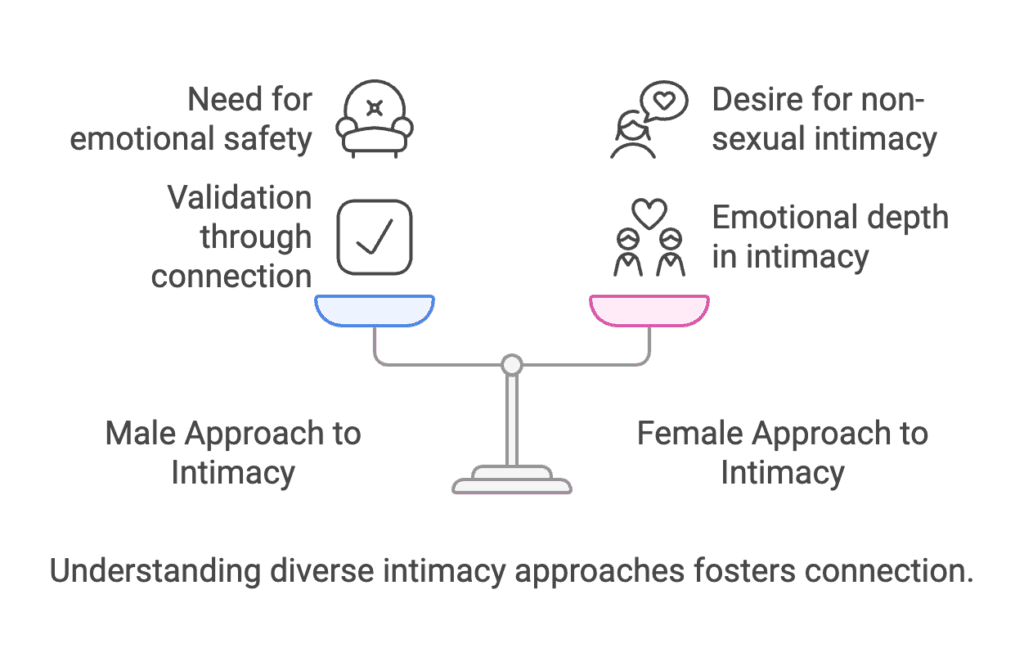The topic of male sexuality often feels like a minefield. Misunderstandings, stereotypes, and societal pressures can make it difficult to have honest conversations about what drives men sexually and how they view intimacy. But peeling back the layers reveals something far more complex and human than the one-dimensional portrayals often found in pop culture. If you want to dig deep into this, firs read “Definition of a Real Man“.

This article delves into the male perspective on sexuality, weaving in scientific studies to ground the discussion in evidence while aiming to bridge the gap in understanding between men and women.
The biological foundation of male sexuality
Male sexuality is influenced by a combination of biology, psychology, and social conditioning. On a biological level, testosterone plays a significant role in shaping male sexual desire and behavior. Research published in the Journal of Sexual Medicine highlights how testosterone levels are directly correlated with sexual desire in men, but they’re far from the only factor.
Men are often thought of as being primarily visually driven when it comes to sexual attraction. While there’s truth to this—studies show that men tend to respond more strongly to visual stimuli than women—this doesn’t mean men lack emotional or psychological depth in their sexual experiences. According to findings from the Kinsey Institute, men’s sexual satisfaction often depends just as much on emotional connection and mutual respect as it does on physical attraction.
How men perceive intimacy
Men and women often approach intimacy differently, but these differences don’t make one perspective better or worse. For many men, sexual intimacy is not just about physical pleasure but also about validation, connection, and vulnerability.
1. Validation through sexual connection
Sex can serve as a form of validation for men. In a society where men are often conditioned to suppress their emotions, physical intimacy may become one of the few areas where they feel truly seen and accepted. A study in the Archives of Sexual Behavior found that men who experience frequent, fulfilling sexual connections report higher levels of self-esteem and emotional well-being.
2. The importance of emotional safety
Contrary to stereotypes, many men value emotional safety in their sexual relationships. Feeling judged or inadequate can significantly impact a man’s sexual confidence and performance. Women often don’t realize how deeply men can internalize feelings of rejection or criticism in the bedroom.
3. Physical touch as a language of love
For some men, physical touch is a primary love language. Sexual intimacy becomes a way to communicate affection, commitment, and love. This perspective isn’t about objectifying a partner but rather using physical closeness as a form of emotional expression.
Bridging the gap: Helping women understand the male perspective
Understanding male sexuality isn’t about pandering or excusing unhealthy behavior. It’s about recognizing the nuances and opening up conversations that foster empathy and connection.
1. Men’s desire for mutual pleasure
There’s a misconception that men are solely focused on their own pleasure during sex. However, studies like those published in the Journal of Sex Research show that most men report higher satisfaction when their partner is equally engaged and enjoying the experience. Mutual pleasure is often a top priority for men in healthy relationships.
2. Reducing performance pressure
Performance anxiety is a significant issue for many men. The pressure to “perform” can lead to feelings of inadequacy and even physical issues like erectile dysfunction. Open communication and reassurance can go a long way in alleviating these concerns.
3. The need for non-sexual intimacy
While sex is important, most men also crave non-sexual forms of intimacy, such as meaningful conversations, shared activities, and physical affection that isn’t sexual in nature. These moments help build trust and deepen the overall connection between partners.
Scientific insights into male sexual behavior
To better understand the male perspective, it’s helpful to explore some key findings from sexual studies:
- Sexual satisfaction and relationship quality: A study from the Kinsey Institute found that men who report higher sexual satisfaction are more likely to have strong emotional bonds with their partners.
- The impact of testosterone: Research in the Journal of Clinical Endocrinology & Metabolism highlights that while testosterone levels influence sexual desire, psychological and relational factors play an equally critical role.
- Men and communication: According to a report from the American Psychological Association, men are more likely to struggle with communicating their sexual needs, which can lead to frustration and misunderstandings.
Finishing up
The male perspective on sexuality is nuanced and deeply tied to emotional, psychological, and physical factors. Understanding this perspective isn’t just beneficial for men; it’s a crucial step toward building healthier, more fulfilling relationships.
For women, approaching these conversations with curiosity and openness can break down barriers and create stronger connections. And for men, learning to articulate their needs and desires more effectively can pave the way for greater intimacy and mutual understanding. Bridging this gap starts with listening, empathy, and a willingness to see beyond stereotypes into the complexity of human connection.








